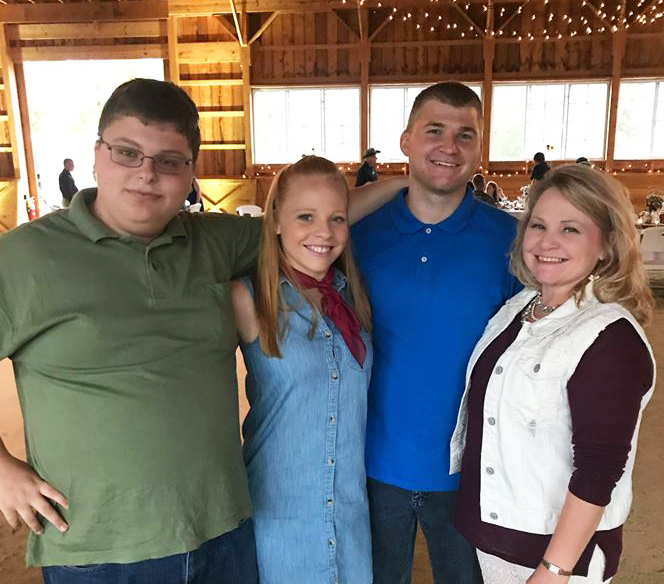Dianne’s Journey: The Trial
“The way you get through tough times is by taking care of someone else.” ~ Dianne Frana
Her blonde waves, set off by a navy flowered dress, cascade over Dianne Frana’s shoulders.
“I was in such a rush to start and finish my treatment that I didn’t think about anything else. I just wanted to get it over with while I had the summer off from my job in staff support at school.” Dianne sits up straight, smiling. “I just accepted the oncologist’s recommendation, and thought I’d just plough through it, no questions asked.”
But a slight delay changed the trajectory of her treatment. Suddenly, the definite course became hazier.
In May 2015, when the waistband of her pants irritated a birthmark on her abdomen and the resulting sore didn’t heal, Dianne went to her dermatologist. He removed and cultured the sore, and then—much to her surprise—telephoned her, asking her to come into his office. It was melanoma, he said, and he’d need to operate and make clean margins. He also recommended she see an oncologist for further diagnosis.
So, in June, she made an appointment with a surgeon who injected a dye into the melanoma site to see if any nearby lymph nodes would take up the dye. When lymph nodes in her groin did, it was clear that Dianne had developed satellites—microscopic cancer dots, and that she had stage 3C melanoma.
She decided not to tell her husband or three children who were in their mid-teens and early 20s until she knew exactly what the treatment would entail. She met with an oncologist who recommended a standard treatment which would have flu-like side effects. She was to administer the drugs herself, at home. And she was in a rush to get started.
Then, she told her family. But the plan she told them about didn’t materialize. For a subsequent test indicated a spot on her liver, and the doctor wouldn’t proceed without knowing more.
The rose-colored stone in the pendant around Dianne’s neck sparkles. “If that spot, which proved to be nothing, hadn’t shown up, I wouldn’t have had a second opinion,” she says. “But when they delayed treatment, I just happened to have a conversation with a friend who suggested getting a second opinion with another doctor. This new doctor spent three hours with me. I felt an immediate connection.
“If I hadn’t talked to him, I wouldn’t have known about the trial that he told me I was eligible for…” She taps her pearl-white painted nails on the table top. A silver bracelet slides down her arm.
“I’m a big proponent of drug trials,” she says, smiling broadly. “A trial saved me. And I almost missed it. I signed up on the last day it was open.” Dianne pushes her black-rimmed glasses up her nose. “Someone was looking over me.”
For one year, she went to an infusion center two or three times a month, as part of a trial evaluating immunotherapy treatments. She signed a confidentiality agreement and still, several years later, cannot talk about the trial in detail.
It was tough to keep working, for the fatigue was overwhelming. “I was utterly exhausted. I made accommodations where I could. That year I didn’t decorate our whole house for Christmas: I just put up a tree,” she says.
Dianne continued working at school, as well as at her part-time marketing job with Caring Grace Home Care Agency, a job she’d started a year before, just after her father died. She had employed the agency’s caregivers to tend to him.
But work at the school was very, very hard. “I worked with kids in special education, and my boss didn’t understand that I needed an easy case load that year. My blood pressure went sky high, and it wasn’t from treatment; it was from my job. I needed understanding myself, ” Dianne sighs. “So, I went on disability from May until June 2016.”
Treatment finally ended in September 2016. The only long-lasting effect was a thyroid problem, and she is now on daily medication.
For the first two years after treatment, Dianne underwent CT scans and MRIs every three months, then every six months. Now, the interval between visits has increased, and will continue to do so.
And then, in 2018, Dianne joined Caring Grace full-time as Client Coordinator. She smiles, “My employer showed great understanding while I was going through treatment. She understood the level of my exhaustion.”
As Dianne regained her strength, she began to look around to see if she could help others in the community. She could. First, she participated in a conference in Boston with pharmaceutical companies to discuss her experience. And then she discovered the Cancer Hope Network which offers support to adult cancer patients. She volunteered, and was linked with people who’d benefit from her own experience.
Dianne shifts in her seat. “These patients mentor me as much as I help them,” she says. “By working with them, I’ve learned that the way to get through tough times is by taking care of someone else.”
She stands, slipping her puffy coat over her dress. “That’s one thing I learned,” she nods. “I also learned other things: always get a second opinion; try to find a doctor you have rapport with; make sure your employer treats you well, and find another job, if not; and read positive quotes.
“There’s one quote I read daily,” she continues. “I purchased a plaque with the saying right after my father received his diagnosis. It says that you don’t get the people you want. You get the people you need to help you, hurt you, leave you, love you, and make you into the person you’re meant to be.”
Dianne waves and heads out the door, ready to help.
______________________________
Dianne Frana has attended educational programs and luncheons at the Cancer Support Community including, most recently, the Biden Cancer Summit.


